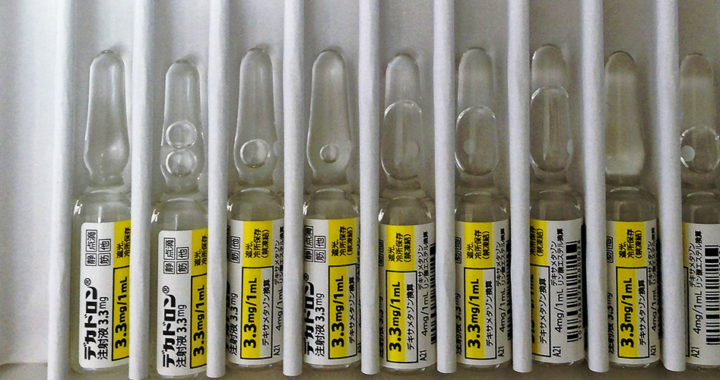The World Health Organization welcomed on 16 June 2020 the preliminary results of a clinical trial from the United Kingdom showcasing the usefulness of dexamethasone in treating critically ill COVID-19 patients. First developed in 1957 and approved for medical use in 1961, this drug is on the List of Essential Medicines of WHO.
Pharmacology and Mechanism: What is Dexamethasone? How Does it Work?
Dexamethasone is a synthetic adrenal corticosteroid under the glucocorticoid class of steroid hormones with potent anti-inflammatory and immunosuppressive properties. Glucocorticoids are primary steroid hormones essential for the metabolism of macronutrients, as well as for mediating and regulating mediating immune response and inflammation.
Remember that dexamethasone is a synthetic glucocorticoid. It is an agonist of the glucocorticoid receptor or GR that works similar to other natural and synthetic glucocorticoids. However, it is 30 times more potent than the naturally-occurring cortisol. Once administered, it binds to this receptor and activates it to produce a biological response.
The glucocorticoid receptor is a member of the nuclear receptor superfamily. It functions as an intercellular agent that controls the transcription of 10 to 20 percent of genes in the human genome, as well as the up-regulation of anti-inflammatory proteins and down-regulation of pro-inflammatory proteins. The activation of this receptor generally explains the anti-inflammatory and immunosuppressive properties and applications, as well as the primary mechanism of action of dexamethasone.
Essentially, like any other glucocorticoids, the drug promotes the transrepression of pro-inflammatory mediators and the transactivation of anti-inflammatory mediators. Furthermore, its immunosuppressive effects are mediated by suppressing delayed hypersensitivity reactions by direct action on immune cells called T-lymphocytes.
Applications: What are the Uses of this Medication? What is the Clinical Importance?
Dexamethasone has become a clinically important drug in several branches of medicine to include allergology, pulmonology, immunology, rheumatology, endocrinology, and oncology since its synthesis in 1957.
The drug has been used in the specific treatment of medical conditions ranging from severe allergies and asthma to chronic obstructive pulmonary disease, and certain kinds of autoimmune and inflammatory diseases.
Medical professionals have also administered dexamethasone in treating infectious diseases. For example, in moderate-to-severe acute respiratory distress syndrome or ARDS due to widespread inflammation in the lungs from a cytokine storm, studies have concluded that early therapy with this medication could change the systemic immune responses. It could reduce the duration of mechanical ventilation and the overall mortality of patients.
The same impact on ARDS has made this medication a potential part of treating and managing severe cases of COVID-19 caused by the SARS-CoV-2. Preliminary results of clinical trials in the United Kingdom suggest that its low-dose administration could reduce death rates by approximately one-third of critically ill COVID-19 patients.
Because of its anti-inflammatory and immunosuppressive properties, it is administered before antibiotics in cases of bacterial meningitis. Note that bacterial death releases pro-inflammatory mediators that can cause a harmful immune response. The medication can lessen the risk of administering antibiotics.
Dexamethasone is also an antiemetic drug. People with cancer undergoing chemotherapy are given this medication to lessen nausea and vomiting. The exact mechanism of action of this application remains unknown, but studies showed that dexamethasone could increase the antiemetic effect of 5-HT3 receptor antagonists.
Adverse Effects: What are the Side Effects of Dexamethasone? What are its Limitations?
There is a growing body of literature investigating and documenting the side effects of dexamethasone. Common downsides include insomnia, vertigo, increased appetite, weight gain, acne, hypertension, impaired skin healing, depression, and euphoria.
About 10 percent of patients under long-term treatment develop cataracts. Furthermore, because it is an immunosuppressant, it increases the risk of infection, and in patients confined in hospitals, it increases the risk of hospital-acquired infections.
Specific applications in managing ARDS also suggest that it is only useful in treating severely ill patients. The same is true in treating and managing certain clinical presentations of COVID-19 patients who are using ventilators. It does not guarantee full recovery and survival. Furthermore, it is not an antiviral or antimicrobial medication.
Sudden withdrawal after long-term use can also result in adrenal insufficiency. The supplementation of corticosteroids could induce temporary dependence. In adrenal insufficiency, drugs such as dexamethasone can temporarily halt the natural production of steroid hormones by the adrenal glands.
FURTHER READINGS AND REFERENCES
- Konsyse Staff. 2020. “Dexamethasone as COVID-19 Treatment: An Overview.” Konsyse. Available online
- Ledford, H. 2020. “Coronavirus Breakthrough: Dexamethasone is First Drug Shown to Save Lives.” Nature. DOI: 10.1038/d41586-020-01824-5
- National Center for Biotechnology Information. n.d. “Dexamethasone, CID+5743.” PubChem Database. Available online
- Oakley, R. H. and Cidlowski, J. A. 2013. “The Biology and the Glucocorticoid Receptor: New Signaling Mechanisms in Health and Disease.” Journal of Allergy and Clinical Immunology. 132(5): 1033-1044. DOI: 1016/j.jaci.2013.09.007
- Webster, J. C. and Cidlowski, J. A. 1997. Control of Steroid Receptor Function and Gene Expression: The Glucocorticoid Receptor. Principles of Medical Biology. 10: 311-320. DOI: 1016/S1569-2582(97)80039-6
- Villar, J., Ferrando, C., Martínez, D., Ambrós, A., Muñoz, T., Soler, J. A., Aguilar, G., Alba, F., González-Higueras, E., Conesa, L. A., Martín-Rodríguez, C., Díaz-Domínguez, F. J., Serna-Grande, P., Rivas, R., Ferreres, J., Belda, J., Capilla, L., Tallet, A., Añón, J. M., … Villar, J. 2020. “Dexamethasone Treatment for the Acute Respiratory Distress Syndrome: A Multicentre, Randomized Controlled Trial.” The Lancet Respiratory Medicine. 8(3): 267–276. DOI: 1016/S2213-2600(19)30417-5
- World Health Organization. 2020. “WHO Welcomes Preliminary Results About Dexamethasone Use in Treating Critically Ill COVID-19 Patients.” The World Health Organization. Available online
